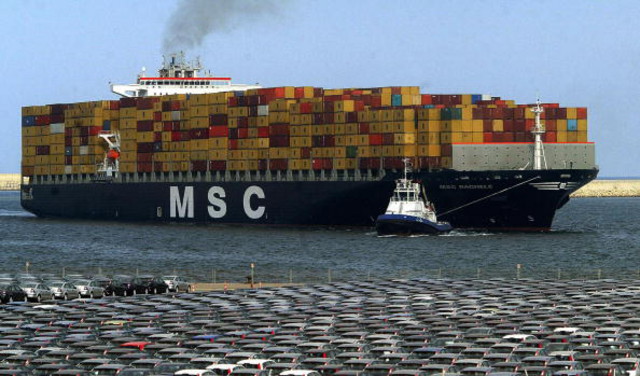Egypt’s Ministry of Planning, Economic Development, and International Cooperation announced that the French government has extended approximately €4bn in financing to support Egypt’s public and private sectors. The package includes €3.5bn allocated to public sector projects, $500m to boost private sector investment, and €12.6m in development grants.
In addition, the French Development Agency (AFD) has overseen €150m in European Union-funded grants directed toward critical projects in sectors such as sustainable transport (including metro systems), housing, education, healthcare, sanitation, renewable energy, and social protection.
The announcement came in a report issued Monday, coinciding with the visit of French President Emmanuel Macron to Egypt. The report, which outlines the evolution of Egyptian-French economic cooperation, highlights the expanding scope and scale of bilateral relations—particularly since President Abdel Fattah Al-Sisi took office in 2014. This progress has been marked by reciprocal high-level visits and a growing number of joint development projects.
The current development cooperation portfolio between Egypt and France stands at around €1.5bn, spanning areas including transport, housing, education, environmental sustainability, and women’s empowerment.
The strengthening of these ties aligns with the joint declaration signed in March 2024 by President Al-Sisi and European Commission President Ursula von der Leyen, which elevated EU-Egypt relations to the level of a strategic partnership. This step is expected to significantly enhance collaboration between Egypt and European countries in trade, investment, and development.
Although Egypt and France have a long-standing relationship, economic cooperation has expanded substantially over the past decade. President Al-Sisi visited France in 2014, 2017, and 2020, while President Macron previously visited Egypt in 2015 for the inauguration of the New Suez Canal and again in 2019. Macron’s current visit reflects a shared commitment to deepening bilateral relations and building on joint achievements across various development fields.
A 2006 framework agreement signed during a previous French presidential visit laid the foundation for formal cooperation through the French Development Agency, which opened its Cairo office in 2007. In 2020, Minister Rania Al-Mashat visited France and signed a set of financing agreements with AFD to accelerate Egypt’s green transition and boost human capital investment.
AFD now plays a key role in supporting Egypt’s green transformation efforts, notably through its participation in the national “NWFE” (Nexus of Water, Food, and Energy) program. Projects include the Alexandria Regional Control Centre and the Abu Qir Metro Project, which are aimed at modernizing Egypt’s energy and transport infrastructure.
The Greater Cairo Metro project remains one of the most prominent examples of Egyptian-French cooperation. Serving millions of passengers daily, the metro eases traffic congestion and provides an environmentally friendly transport solution. France has also supported the upgrade of Metro Line 1 and the development of the Tanta–Mansoura–Damietta railway line.
Beyond infrastructure, the bilateral cooperation portfolio includes several programs focused on energy sector reform, green hydrogen development, and inclusive social policies. These include the energy sector budget support program, technical assistance to advance Egypt’s green hydrogen roadmap, and initiatives targeting social protection and gender equality.
Among these is the Universal Health Insurance System support program, which France is co-financing alongside other international development partners, and a project to promote gender equity in urban transport.
During COP27, Egypt launched a pioneering initiative aimed at accelerating gender equality in climate action. Supported by the European Bank for Reconstruction and Development (EBRD), AFD, and the African Development Bank (AfDB), the program seeks to equip private sector companies with tools to integrate gender considerations into climate governance, bridging the gap between gender and climate policy.
In education, France has contributed to re-establishing the French University in Egypt and is funding a technical cooperation project to support the teaching of French as a foreign language in public schools—reinforcing cultural and academic ties.
In 2022, Egypt and AFD launched a new country strategy running through 2025 under the slogan “Towards Shared Prosperity.” The strategy is built around three key pillars:
Enhancing the regional integration of Egypt’s financial, trade, and production systems;
Supporting the development of inclusive and resilient social infrastructure; and
Promoting sustainable local development aligned with environmental goals.
Sub-pillars include fostering job creation, innovation, and entrepreneurship while advancing the green economy.
France also remains one of Egypt’s top European trading partners. According to data from the Central Agency for Public Mobilisation and Statistics (CAPMAS), Egyptian exports to France rose by 22.4% in 2024, reaching $1.1bn—up from $855.4m in 2023. Imports from France grew by 10.8% to $1.8bn, up from $1.7bn in 2023. As a result, total trade between the two countries climbed 14.7% to $2.9bn in 2024, compared to $2.5bn the previous year.
In addition, numerous French companies continue to invest significantly in Egypt, particularly in the energy, transport, and retail sectors—further strengthening the bilateral economic relationship and supporting Egypt’s long-term development goals.



